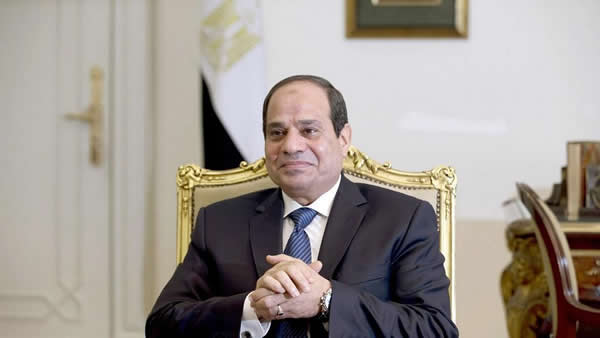
President Abdel-Fattah el-Sissi
As Egypt takes over the chairmanship of the African Union (AU), the North African country will be keen to restore its erstwhile role as a driving force in the African continent- experts have said.
On Sunday, Egyptian President Abdel Fattah al-Sisi took over the AU presidency from his Rwandan counterpart Paul Kagame.
It is the first time that Egypt is elected AU chair since the launch of the African bloc in 2002.
“Egypt’s presidency of the AU came as a result of Egypt’s and al-Sisi’s efforts to enhance the relations with the African leaders over the past few years,” said Mohamed Aly, a researcher with Cairo-based Ahram Center for Political and Strategic Studies.
Under the administration of former President Hosni Mubarak, especially after the assassination attempt on him in Ethiopia’s capital Addis Ababa in 1995, the ties between Egypt and the African Union witnessed a significant deterioration, which was reflected in worsening relations with the Nile Basin countries including Sudan and Ethiopia.
However, the current Egyptian administration has made relations with Africa a priority by seeking to revive Egypt’s role as a leading African nation through a more active political, military and economic role in Africa, Aly told Xinhua.
Since taking office in 2014, al-Sisi has paid nearly 20 visits to other African nations, including three visits to Ethiopia and four to Sudan.
According to the official statistics, al-Sisi’s visits to Africa have constituted 30 percent of his overall international trips.
Egypt has undertaken a number of important initiatives to restore its role in Africa, including training for peacekeepers and military personnel, increasing security and intelligence cooperation, and convening three economic conferences to encourage greater intra-African economic and business cooperation.
In his address to the AU summit which concluded on Monday, al-Sisi said Egypt will be tasked with the organization’s institutional reform and rehabilitation of refugees and internally displaced persons.
“I am well aware of the great responsibility for coordinating joint African action under the current tough and critical international and continental circumstances which are exacerbated by disputes, extremism and terrorism,” al-Sisi said.
Egypt has set an ambitious plan to contribute to the African Agenda 2063, a strategic master plan for the socio-economic transformation of the continent over the next 50 years, the president noted.
Egypt has a number of vital interests in the African continent, the foremost among which are the water security, peace, stability and anti-terrorism, said Noha Bakir, a professor of international relations at the American University in Cairo.
Despite relentless diplomatic efforts to sway some Nile Basin countries from undertaking projects that might affect Egypt’s overall share of the Nile water, Egypt has yet to take more steps, according to Bakir.
The perplexing situation in Libya, the terrorist activities in sub-Saharan Africa and the security of the eastern Red Sea coast are closely linked to security of the borders and the Suez Canal in Egypt, the professor explained.
Egypt is also the gate to economic and investment advantages from some Asian and European countries, Bakir highlighted.
The African countries have seen how Egypt restored its stability and security as well as political and economic influence in the region in a short period, which has consolidated their confidence in the most populous Arab country, he concluded.
Source: GNA























